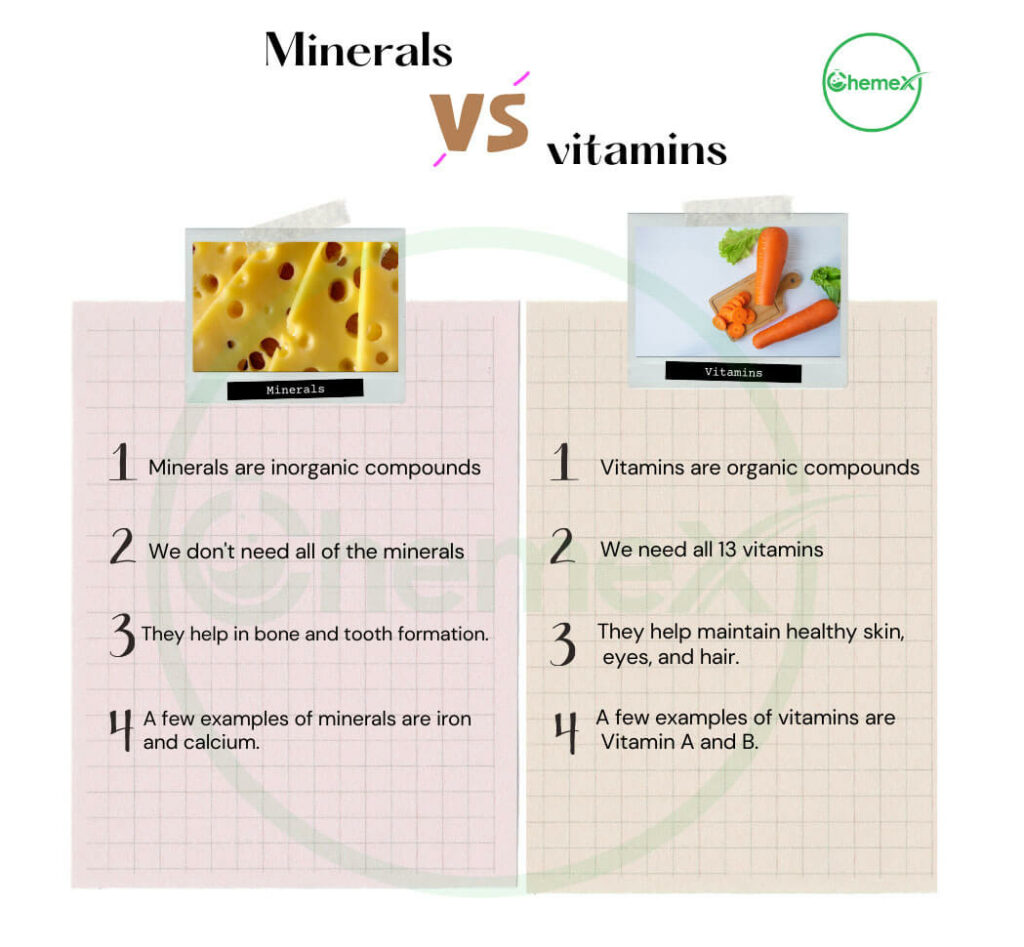The role of vitamins in the body is so important that their absence can cause a variety of diseases in an individual. Vitamins are organic compounds that are essential for human life and health. Beriberi disease is one of the diseases that occur due to a lack of vitamins in people. Increasing the body’s metabolism leads to growth and health, which can be done by taking vitamins.
Vitamins can be found in a variety of dairy foods, such as fruits and vegetables. However, some people turn to pills and ampoules with a doctor’s prescription due to a severe deficiency in the required amount of vitamins.
The difference between vitamins and minerals:
Vitamins and minerals are often called micronutrients because the body needs only a small amount of them. However, if this small amount is not provided, the deficiency of vitamins will have an effect on the body, and you will get sick. Although vitamins and minerals are both micronutrients, they are different in some raw materials. Vitamins are organic and decompose due to heat, air, or acid. Minerals are inorganic and retain their chemical structure.

Vitamins are divided into two important categories: water-soluble vitamins and fat-soluble vitamins.
Water-soluble vitamins:
Water-soluble vitamins move freely in the body, and excess amounts are usually excreted by the kidneys. The body needs water-soluble vitamins in small and intermittent doses. This type of vitamin is less likely to reach toxic levels than fat-soluble vitamins. But, consumption of niacin, vitamin B6, folate, choline, and vitamin C is limited. Excessive consumption of vitamin B6, in the long run, leads to nerve damage that is irreversible. A balanced diet contains sufficient amounts of these vitamins.
Because a large portion of the body is made up of water, many water-soluble vitamins flow easily throughout the body. The kidneys regularly regulate the number of water-soluble vitamins and excrete large amounts of them in the urine.
Fat-soluble Vitamins:
Fat-soluble vitamins are stored in the body’s cells, and their excretion is not simply the excretion of water-soluble vitamins. Although adequate amounts of these vitamins are needed by the body, they do not need to be taken alternately with water-soluble vitamins. Excessive consumption of fat-soluble vitamins can lead to poisoning. A balanced diet contains sufficient amounts of fat-soluble vitamins. Vitamin E, Vitamin K, Vitamin D, and Vitamin A are fat-soluble. For example, vitamin D is difficult to get through food alone and is better than vitamin D or multivitamin supplements. Use products containing vitamin D.
Vitamins regulate the body’s metabolism, and a deficiency of only one vitamin can endanger the entire human body. It is good to know that most vitamins are extracted from natural sources.
Fruits and vegetables are good sources of a variety of vitamins. In addition, some supplements can be useful and effective in providing the body with the vitamins it needs. In this part, you can see vitamin lists.
Vitamin A:
Vitamin A is one of the fat-soluble vitamins that are useful and necessary for maintaining the health of the skin, bones, and other tissues of the body. This vitamin is a powerful antioxidant and is found in animal products such as meat, eggs, milk, butter, fortified margarine, poultry, fish, and dairy products, as well as in plant foods such as fruits and vegetables.
If you are deficient in vitamin A, you may develop malaria, HIV, measles, and diarrhea. Among the benefits of this vitamin for the body are reducing the risk of cancer, strengthening the immune system, reducing acne and pimples, strengthening bones, and preventing osteoporosis and their damage, as well as helping the normal growth of the fetus during pregnancy. is. The many benefits of this vitamin have led to increased sales of vitamin A palmitate and its supplements.
Vitamin C:
Vitamin C, or ascorbic acid, is a water-soluble vitamin that is not made in the human body. This makes it an essential micronutrient for humans that should be received through their daily diet. Vitamin C also acts as an antioxidant in the body and protects cells from damage caused by harmful chemicals called free radicals. vitamin C is one of the best vitamins for skin.
 Free radicals are caused by intracellular metabolism, air pollution, smoking, and ultraviolet rays, and this vitamin can protect the body against damage caused by them. Vitamin C also helps other antioxidants, such as vitamins E and A, function better in the body.
Free radicals are caused by intracellular metabolism, air pollution, smoking, and ultraviolet rays, and this vitamin can protect the body against damage caused by them. Vitamin C also helps other antioxidants, such as vitamins E and A, function better in the body.
Ascorbic acid (vitamin C) is found in abundance in many fruits and vegetables. Rich sources of vitamin C, respectively, the number of vitamins in them, including citrus fruits (oranges, lemons, and grapefruits), sweet peppers (red, yellow, and green), kiwi, broccoli, strawberries, tomatoes, red cabbage, and flowers. In addition to food sources, vitamin supplements are readily available through pharmacies, the most common of which are powders, liquids, vitamin C tablets, and effervescent vitamin C tablets.
Vitamin E:
Vitamin E is known as one of the most important and essential vitamins for the health of the body, especially for maintaining healthy skin and eyes. This substance has antioxidant properties and protects cells. Vitamin E is fat-soluble and can be found in foods such as vegetable oils, canola oil, olive oil, margarine, almonds and peanuts, cereals, meat, poultry, chicken eggs, fruits (such as cantaloupe, grapefruit, and apricots), vegetables, and wheat germ oil. Among the uses and benefits of this vitamin, we can mention preventing skin ageing, treating cancer, inhibiting the effects of free radicals, etc.
Vitamin B2:
Vitamin B2 is one of the vitamins that has a great effect on lipid metabolism. This vitamin is also known as riboflavin, and it is one of the essential vitamins for the body that is not stored in the body and is effective in healing mouth ulcers. Eliminating dandruff, promoting hair growth, eliminating bulimia, improving itching and burning of the eyes, reducing migraine headaches, reducing gingivitis, and reducing anorexia nervosa are some of the uses and benefits of vitamin B2.

A deficiency of this substance in the body can reduce the body’s immunity and cause skin problems and liver failure. Also, the defence mechanisms in the cells of these people are disrupted. Vitamin B2 can be found in many foods, such as dairy products (especially milk and cheese), eggs, meats, fresh vegetables, liver, and offal. We can also find it in wheat germ, peanuts, walnuts, hazelnuts, pistachios, sunflower seeds, avocado, apricot, raspberry, barley, soy, cauliflower, whey, yoghurt, cranberries, potatoes, pinto beans, tomatoes, grapes, dates, coconut, chestnut, peas, lentils, beets, found cobs, asparagus, lettuce, etc.
However, people with riboflavin deficiency can make up for this by buying vitamin B2 and its supplements.
Vitamin B12:
One of the water-soluble vitamins found naturally in some foods is vitamin B12. It is also available as a dietary supplement and medicine. Meat products, some fortified foods, beef and mutton liver, meat, fish, eggs, chicken, milk and dairy, and some breakfast cereals are all important sources of this vitamin. It can also be found in all multivitamins and supplements. People who are deficient in vitamin B12 can use the drug forms of this substance, which include sublingual tablets, ampoules, and nasal gels (for use in the nose). Moreover, this is one of the best vitamins for depression.

Symptoms of deficiency include strange sensations, numbness, or tingling in the hands and feet; gait disturbances and balance problems; anaemia; memory loss; cognitive problems; weakness; and fatigue. This substance helps prevent anaemia and maintain the health of blood cells in the organs of the body. Therefore, it can be concluded that the purchase of vitamin B12, foods containing this substance, and its supplements are important and necessary for a healthy body.
Vitamin B6:
Vitamin B6 is one of the water-soluble vitamins that you can often supplement with Vitamin B Complex. However, single supplements or ampoules of vitamin B6 can also be used. This vitamin has many properties for the body, including its effect on improving mood, brain function, helping to treat anaemia, eye health, improving the symptoms of premenstrual syndrome, etc.

Most people consider vitamin A to be the only factor in eye health and the prevention of eye diseases. However, vitamin B6 also helps prevent eye diseases such as macular degeneration caused by ageing.
A balanced diet provides the vitamins your body needs because, without their presence in food, the health and balance of the body organs become unstable, vital functions are disrupted, and complications occur, which sometimes lead to death.






